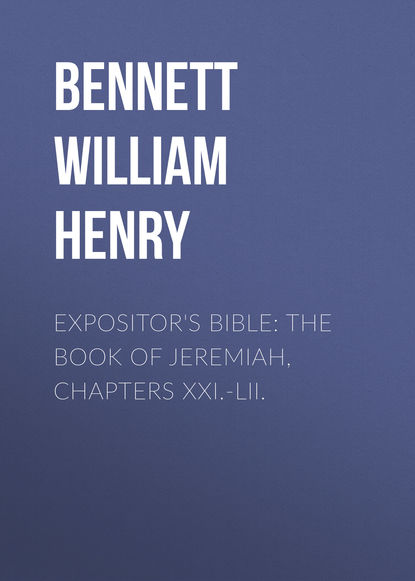По всем вопросам обращайтесь на: info@litportal.ru
(©) 2003-2024.
✖
Expositor's Bible: The Book of Jeremiah, Chapters XXI.-LII.
Настройки чтения
Размер шрифта
Высота строк
Поля
Write this man childless,
A man whose life shall not know prosperity:
For none of his seed shall prosper;
None shall sit upon the throne of David,
Nor rule any more over Judah."
Thus, by Divine decree, the descendants of Jehoiakim were disinherited; Jehoiachin was to be recorded in the genealogies of Israel as having no heir. He might have offspring,[100 - 1 Chron. iii. 17 mentions the "sons" of Jeconiah, and in Matt. i. 12 Shealtiel is called his "son," but in Luke iii. 27 Shealtiel is called the son of Neri.] but the Messiah, the Son of David, would not come of his line.
Two points suggest themselves in connection with this utterance of Jeremiah; first as to the circumstances under which it was uttered, then as to its application to Jehoiachin.
A moment's reflection will show that this prophecy implied great courage and presence of mind on the part of Jeremiah – his enemies might even have spoken of his barefaced audacity. He had predicted that Jehoiakim's corpse should be cast forth without any rites of honourable sepulture; and that no son of his should sit upon the throne. Jehoiakim had been buried like other kings, he slept with his fathers, and Jehoiachin his son reigned in his stead. The prophet should have felt himself utterly discredited; and yet here was Jeremiah coming forward unabashed with new prophecies against the king, whose very existence was a glaring disproof of his prophetic inspiration. Thus the friends of Jehoiachin. They would affect towards Jeremiah's message the same indifference which the present generation feels for the expositors of Daniel and the Apocalypse, who confidently announce the end of the world for 1866, and in 1867 fix a new date with cheerful and undiminished assurance. But these students of sacred records can always save the authority of Scripture by acknowledging the fallibility of their calculations. When their predictions fail, they confess that they have done their sum wrong and start it afresh. But Jeremiah's utterances were not published as human deductions from inspired data; he himself claimed to be inspired. He did not ask his hearers to verify and acknowledge the accuracy of his arithmetic or his logic, but to submit to the Divine message from his lips. And yet it is clear that he did not stake the authority of Jehovah or even his own prophetic status upon the accurate and detailed fulfilment of his predictions. Nor does he suggest that, in announcing a doom which was not literally accomplished, he had misunderstood or misinterpreted his message. The details which both Jeremiah and those who edited and transmitted his words knew to be unfulfilled were allowed to remain in the record of Divine Revelation – not, surely, to illustrate the fallibility of prophets, but to show that an accurate forecast of details is not of the essence of prophecy; such details belong to its form and not to its substance. Ancient Hebrew prophecy clothed its ideas in concrete images; its messages of doom were made definite and intelligible in a glowing series of definite pictures. The prophets were realists and not impressionists. But they were also spiritual men, concerned with the great issues of history and religion. Their message had to do with these: they were little interested in minor matters; and they used detailed imagery as a mere instrument of exposition. Popular scepticism exulted when subsequent facts did not exactly correspond to Jeremiah's images, but the prophet himself was unconscious of either failure or mistake. Jehoiakim might be magnificently buried, but his name was branded with eternal dishonour; Jehoiachin might reign for a hundred days, but the doom of Judah was not averted, and the house of David ceased for ever to rule in Jerusalem.
A man whose life shall not know prosperity:
For none of his seed shall prosper;
None shall sit upon the throne of David,
Nor rule any more over Judah."
Thus, by Divine decree, the descendants of Jehoiakim were disinherited; Jehoiachin was to be recorded in the genealogies of Israel as having no heir. He might have offspring,[100 - 1 Chron. iii. 17 mentions the "sons" of Jeconiah, and in Matt. i. 12 Shealtiel is called his "son," but in Luke iii. 27 Shealtiel is called the son of Neri.] but the Messiah, the Son of David, would not come of his line.
Two points suggest themselves in connection with this utterance of Jeremiah; first as to the circumstances under which it was uttered, then as to its application to Jehoiachin.
A moment's reflection will show that this prophecy implied great courage and presence of mind on the part of Jeremiah – his enemies might even have spoken of his barefaced audacity. He had predicted that Jehoiakim's corpse should be cast forth without any rites of honourable sepulture; and that no son of his should sit upon the throne. Jehoiakim had been buried like other kings, he slept with his fathers, and Jehoiachin his son reigned in his stead. The prophet should have felt himself utterly discredited; and yet here was Jeremiah coming forward unabashed with new prophecies against the king, whose very existence was a glaring disproof of his prophetic inspiration. Thus the friends of Jehoiachin. They would affect towards Jeremiah's message the same indifference which the present generation feels for the expositors of Daniel and the Apocalypse, who confidently announce the end of the world for 1866, and in 1867 fix a new date with cheerful and undiminished assurance. But these students of sacred records can always save the authority of Scripture by acknowledging the fallibility of their calculations. When their predictions fail, they confess that they have done their sum wrong and start it afresh. But Jeremiah's utterances were not published as human deductions from inspired data; he himself claimed to be inspired. He did not ask his hearers to verify and acknowledge the accuracy of his arithmetic or his logic, but to submit to the Divine message from his lips. And yet it is clear that he did not stake the authority of Jehovah or even his own prophetic status upon the accurate and detailed fulfilment of his predictions. Nor does he suggest that, in announcing a doom which was not literally accomplished, he had misunderstood or misinterpreted his message. The details which both Jeremiah and those who edited and transmitted his words knew to be unfulfilled were allowed to remain in the record of Divine Revelation – not, surely, to illustrate the fallibility of prophets, but to show that an accurate forecast of details is not of the essence of prophecy; such details belong to its form and not to its substance. Ancient Hebrew prophecy clothed its ideas in concrete images; its messages of doom were made definite and intelligible in a glowing series of definite pictures. The prophets were realists and not impressionists. But they were also spiritual men, concerned with the great issues of history and religion. Their message had to do with these: they were little interested in minor matters; and they used detailed imagery as a mere instrument of exposition. Popular scepticism exulted when subsequent facts did not exactly correspond to Jeremiah's images, but the prophet himself was unconscious of either failure or mistake. Jehoiakim might be magnificently buried, but his name was branded with eternal dishonour; Jehoiachin might reign for a hundred days, but the doom of Judah was not averted, and the house of David ceased for ever to rule in Jerusalem.






